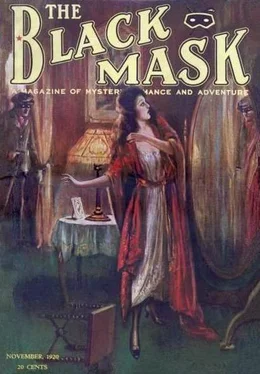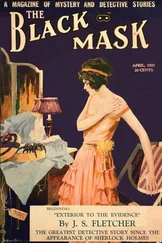Hamilton Craigie - The Black Mask Magazine (Vol. 2, No. 2 — November 1920)
Здесь есть возможность читать онлайн «Hamilton Craigie - The Black Mask Magazine (Vol. 2, No. 2 — November 1920)» весь текст электронной книги совершенно бесплатно (целиком полную версию без сокращений). В некоторых случаях можно слушать аудио, скачать через торрент в формате fb2 и присутствует краткое содержание. Город: New York, Год выпуска: 1920, Издательство: Pro-distributors Publishing Company, Жанр: Классический детектив, на английском языке. Описание произведения, (предисловие) а так же отзывы посетителей доступны на портале библиотеки ЛибКат.
- Название:The Black Mask Magazine (Vol. 2, No. 2 — November 1920)
- Автор:
- Издательство:Pro-distributors Publishing Company
- Жанр:
- Год:1920
- Город:New York
- ISBN:нет данных
- Рейтинг книги:5 / 5. Голосов: 1
-
Избранное:Добавить в избранное
- Отзывы:
-
Ваша оценка:
- 100
- 1
- 2
- 3
- 4
- 5
The Black Mask Magazine (Vol. 2, No. 2 — November 1920): краткое содержание, описание и аннотация
Предлагаем к чтению аннотацию, описание, краткое содержание или предисловие (зависит от того, что написал сам автор книги «The Black Mask Magazine (Vol. 2, No. 2 — November 1920)»). Если вы не нашли необходимую информацию о книге — напишите в комментариях, мы постараемся отыскать её.
The Black Mask Magazine (Vol. 2, No. 2 — November 1920) — читать онлайн бесплатно полную книгу (весь текст) целиком
Ниже представлен текст книги, разбитый по страницам. Система сохранения места последней прочитанной страницы, позволяет с удобством читать онлайн бесплатно книгу «The Black Mask Magazine (Vol. 2, No. 2 — November 1920)», без необходимости каждый раз заново искать на чём Вы остановились. Поставьте закладку, и сможете в любой момент перейти на страницу, на которой закончили чтение.
Интервал:
Закладка:
“Yes,” he said, “I will help you. But do not expect too much. All that I can do is to promise that I will look into this case as thoroughly as my poor abilities will permit.”
Sylvia Granger sprang to her feet.
“Thank you! Thank you!” she cried. “And whether you succeed or whether you fail to save George, please know that you will always have my gratitude and my friendship.”
“Which should be more than enough reward for any man,” Song Kee said, smiling as he bowed her out of the room.
III
The man who left his rooms on a side street off Madison Avenue was a far different Song Kee from the quietly dressed, well-poised man of the world who had promised help to Sylvia Granger at the Traveler an hour or so earlier. His clothes, his linen, his hat—a brown derby with an exceedingly curly brim — were of the fashion of Broadway rather than of Fifth Avenue. His shoes were of a gorgeous tan, contrasting gaily with pale lavender socks.
And in keeping with his clothes, the man himself had changed. The dignity which ordinarily characterized his manner and expression was gone. In its place was a sort of childishly good-natured meekness, not unattractive but in a way almost ridiculous.
He hurried westward until he had crossed Eighth Avenue. Midway in the block he paused before the doorway of the-Branch Detective Bureau. He looked up at the lighted windows and smiled to himself. Not long ago when his study of American customs and methods had led to an examination of the Police System, he had been a familiar and not unpopular figure in and around the old brownstone building. Often since then he had looked back with pleasure to the nights spent in the back room where the boys gathered and passed the time in spinning yarns of their experiences.
A moment later Song Kee entered that back room. He was greeted clamorously by its occupants. Laughing and joking he crossed to the table where a big man sat, his chair tilted back against the wall, his hat pulled forward over his eyes.
“Hello, Mr. Delaney,” Song Kee said in purring, good-natured tones.
The big man looked up.
“Well, dog-gone it, if it ain’t a Ching-a-ling! How’s your soul, you yeller heathen? Wha’d’y’ want around here?”
Song Kee took the man’s rough greeting in good part.
“What do I want?” he laughed. “Maybe I want to hear Mr. Delaney tell about the Grenville murder.”
Delaney glanced at him suspiciously.
“Say, what’s your interest in the Grenville case?” he asked belligerently.
“Oh, nothing much. I just promised a friend I’d look into it.”
Delaney spat disgustedly.
“Well, you’ll be wastin’ your time. The case is an open and shut thing. Grover’s the guy, and we got him. That’s all there is about that.”
“I thought perhaps—” Song Kee began.
“Aw, fergit it.” Delaney interrupted. “The Grenville dame was croaked and Grover done it. He was caught with the goods, wasn’t he? Didn’t the chambermaid see him?”
“Well, according to the papers she didn’t actually see him stab the woman.”
“Naw. But she seen him near the woman just before she was stabbed and that’s enough for me. Besides, didn’t we find his finger-prints on the dagger and he himself says he never touched it after it was in the woman. Then he must have touched it before, mustn’t he?”
Song Kee shook his head meditatively.
“I— I suppose so,” he said, “still—”
Delaney pushed back his chair violently.
“Aw, say, you! You make me sick — always buttin’ in where you ain’t wanted. You—” he paused. Then his manner changed.
“Say,” he went on, “some of the boys around here think I’m sore on you because of that little mess we had awhile ago. Now just to show ’em the kind of guy I am I’ll make you a proposition. If you think you can get anythin’ out of this here Grenville case I’ve missed, go to it! Go as far as you like and I’ll help you.”
Song Kee’s mild eyes gleamed with excitement.
“You mean that, Mr. Delaney?”
“I said it, didn’t I?”
Song Kee pulled up a chair and for a quarter of an hour the two men talked in whispers, Song Kee speaking quickly and excitedly, Delaney listening and making replies in the tolerant manner one uses toward a child. Then they got up and left the building.
They took the Subway downtown to Headquarters, where on Delaney’s authority Song Kee was permitted to examine the dagger throught the agency of which Irene Grenville had met her death.
It was an oddly shaped weapon, with a long handle roughly carved, tapering toward the blade. There was no guard dividing handle and blade. The blade was of an unusual narrowness, shaped like an enlarged bodkin, very sharp at the point, duller at the sides.
With Delaney standing impatiently by, Song Kee favored the deadly instrument with a long examination. Twice he laid it back on the table and turned away from it. But something about it seemed to fascinate him and he returned to it. At last he drew a small rule from his pocket and measured it with great exactness, noting down the measurements on the back of an envelope upon which at the same time he made a most detailed drawing. Then he said to Delaney—
“Is there any proof that this dagger belonged to Grover?”
“Not as I know of. We didn’t bother about that. The finger-prints were enough for us.”
“What did he say about it?”
“Aw, of course he denied ever seein’ the thing before.”
“Yes, he would do that,” Song Kee said.
He picked up the dagger again, holding it by the blade, the end of the handle thus pointed at the detective.
“I wonder,” he said, “why there should be all those little notches along the top of the handle?”
Delaney glanced at the weapon indifferently.
“Why shouldn’t there be? Ain’t it carved all over?”
“Yes, but—”
Song Kee stopped and smiled at the detective.
“Maybe I’m just imagining things, Mr. Delaney,” he said, leading the way from the room.
Before the doorway of Police Headquarters Song Kee paused.
“Delaney,” he said, “did you find any motive for the killing of this Grenville woman either by Grover—or by anyone else?”
Delaney puffed at a cigar he had just fired.
“Well, I figure it this way. Grover was in love with the dame. And he was what I call a ‘one-woman-guy.’ But the ‘one-woman-one-man’ stuff didn’t go with Irene. Anything that wore pants and packed a wad of bills looked good to her. Grover got sore and—woof!” Delaney made an expressive gesture.
“But Grover said—”
“Fergit it, kid. I know what Grover said — but — well—” And Delaney winked broadly.
The next day Song Kee devoted to the curious pursuit of reading old newspapers.
From publication office to publication office he went, going through the files of the morning and evening dailies. He himself could not have told exactly for what he was searching. But he kept on looking, and toward nightfall in a journal noted for its news of the theatrical world he found an item which intrigued him. Surreptitiously he cut it from the paper, and preserving it carefully in his pocketbook, quietly hurried away.
He journeyed uptown to his rooms. For a long time he sat motionless by the window staring unseeingly into the street. His face was as devoid of expression as that of a wooden Indian. Only his eyes were alive and they shone with a lively interest and an intense concentration. Suddenly an exclamation broke from his lips. He jumped to his feet and with the quickness of thought changed into a dinner jacket and left.
He took a taxi to the Ralston Hotel and sent up his card to Mr. Sito Okawa. After a few moments’ wait, he was asked to ascend to the apartment of the Japanese attaché.
Читать дальшеИнтервал:
Закладка:
Похожие книги на «The Black Mask Magazine (Vol. 2, No. 2 — November 1920)»
Представляем Вашему вниманию похожие книги на «The Black Mask Magazine (Vol. 2, No. 2 — November 1920)» списком для выбора. Мы отобрали схожую по названию и смыслу литературу в надежде предоставить читателям больше вариантов отыскать новые, интересные, ещё непрочитанные произведения.
Обсуждение, отзывы о книге «The Black Mask Magazine (Vol. 2, No. 2 — November 1920)» и просто собственные мнения читателей. Оставьте ваши комментарии, напишите, что Вы думаете о произведении, его смысле или главных героях. Укажите что конкретно понравилось, а что нет, и почему Вы так считаете.












